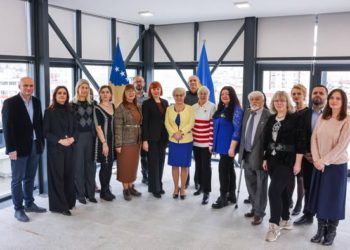“A journalist’s accurate and passionate word instills faith, hope and sets people up for victory,” the acting head of the Kharkiv regional organization of the NUJU, Valerii Daniuk, is convinced that the restoration of media work in front-line and de-occupied territories become one of the symbols of the return of Ukrainian life there.
Over the past year, the NUJU, together with regional organizations, has launched an unprecedented program of support for Ukrainian media, which has covered all regions of the country – from Zakarpattia to front-line territories. Special attention was paid to the restoration of newsrooms in de-occupied territories, where local media provide meaningful, original content.
A vivid example of the return of the Ukrainian press to the de-occupied regions is the multimedia publication Obrii Iziumshchyny, whose printed newspaper was published in 52 issues in 2024. Its own effective distribution system was created without the involvement of Ukrposhta.
The Zaporizhzhia Region can boast of the restoration of two important publications at once. Trudova Slava in Orikhiv resumed publication in April 2023, and Holos Huliaipillia returned to readers in October. These publications are awaited by residents of the front-line territories, because they need verified information.
A powerful support for journalists has become the network of Journalists’ Solidarity Centers (JSC).
The Ivano-Frankivsk JSC, led by the NUJU Secretary Viktoriya Plakhta, has turned into a real hub of assistance to displaced media workers, where professional trainings are held and individual consultations are provided.
The Dnipro JSC, coordinated by Nataliya Nazarova, has become a key point for ensuring the safety of journalists. The Center constantly operates a rental point for protective equipment – bulletproof vests, helmets, and first-aid kits. In 2024, equipment was issued to journalists 66 times.
An important direction for supporting the local press is international cooperation. Thus, the Volyn organization of the NUJU opened a new vector of development by signing a partnership agreement with journalists from the Województwo podkarpackie of Poland, which created new opportunities for professional exchange and joint projects.
The Rivne organization demonstrated incredible resilience when there was a threat of eviction from the premises where the media workers had worked since 1992. The organization found refuge in the local chamber of commerce and industry and continued its active activities.
The Chernivtsi organization conducted a large-scale series of safety training sessions for journalists, including mine safety training, first aid, and cybersecurity. The Vinnytsia organization, led by Maryna Teplenko-Didyk, implemented the NUJU Vinnytsia Reboot project, which included about 100 events.
The Odesa organization, led by Yurii Rabotin, has developed a powerful volunteer direction. “The war has made adjustments to the organization‘s work plans. Many of my colleagues are in the ranks of the Armed Forces of Ukraine, and some have gone abroad. The rest are engaged in volunteering. There is enough work for everyone,” says the head of the regional organization. Together with the Mykolayiv organization, Odesa journalists coordinate assistance to fellow media workers and defenders of Ukraine and organize fundraising for drones for the Armed Forces of Ukraine.
The Poltava organization launched the project “The Well of Memory – Heroes of the Kremenchuk Region,” dedicated to fellow countrymen who died in the war. The Kyiv organization conducts systematic work to support the families of media workers who died in the war and publishes books about journalists in the war.
Over the past year, more than 300 journalists received professional psychological assistance through the NUJU 24-hour hotline, with 90% of calls coming from women.
The Zhytomyr organization focused on supporting veterans of journalism, organizing regular material assistance for them. The All-Ukrainian competition “I am a journalist!” set a record, collecting 846 works from Ukraine and 12 countries around the world.
The Khmelnytskyi, Sumy, and Kirovohrad organizations are making active efforts to support colleagues in the ranks of the Armed Forces of Ukraine. The Kherson organization, despite working in evacuation, coordinates assistance to media workers from temporarily occupied territories. The Lviv and Chernihiv organizations have established an effective system of humanitarian assistance.
The Zakarpattia organization has become a reliable shelter for fellow displaced persons, helping with housing and employment. The Ternopil organization launched a series of professional trainings, and the Cherkasy organization successfully held the “Information Front-line of Cherkasy Region-2024” competition.
Journalists, together with fighters and volunteers, are in the hottest spots of the front and, unfortunately, are also dying… But despite all the challenges, thanks to the systematic work of the Union and the support of international partners, Ukrainian journalism not only survived during the war – it transformed and became stronger. Regional media are mastering new formats of work, developing digital platforms, and remaining a reliable source of information for their communities.
NUJU Information Service
(based on performance reports of NUJU regional organizations for 2024)

 THE NATIONAL UNION OF
JOURNALISTS OF UKRAINE
THE NATIONAL UNION OF
JOURNALISTS OF UKRAINE
















Discussion about this post